Related Research Articles

French Indochina, officially known as the Indochinese Union and after 1947 as the Indochinese Federation, was a grouping of French colonial territories in Mainland Southeast Asia until its demise in 1954. It comprised Cambodia, Laos, the Chinese territory of Guangzhouwan, and the Vietnamese regions of Tonkin in the north, Annam in the centre, and Cochinchina in the south. The capital for most of its history (1902–1945) was Hanoi; Saigon was the capital from 1887 to 1902 and again from 1945 to 1954.

The French colonial empire comprised the overseas colonies, protectorates and mandate territories that came under French rule from the 16th century onward. A distinction is generally made between the "First French colonial empire", that existed until 1814, by which time most of it had been lost or sold, and the "Second French colonial empire", which began with the conquest of Algiers in 1830. On the eve of World War I, France's colonial empire was the second-largest in the world, equating to about one third the size and twelve per cent the population of the British Empire.
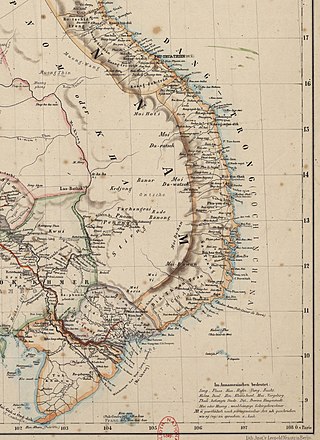
Cochinchina or Cochin-China (, ; Vietnamese: Đàng Trong is a historical exonym for part of Vietnam, depending on the contexts. Sometimes it referred to the whole of Vietnam, but it was commonly used to refer to the region south of the Gianh River.
Decolonization or decolonisation is the undoing of colonialism, the latter being the process whereby imperial nations establish and dominate foreign territories, often overseas. The meanings and applications of the term are disputed. Some scholars of decolonization focus especially on independence movements in the colonies and the collapse of global colonial empires. Other scholars extend the meaning to include economic, cultural and psychological aspects of the colonial experience.
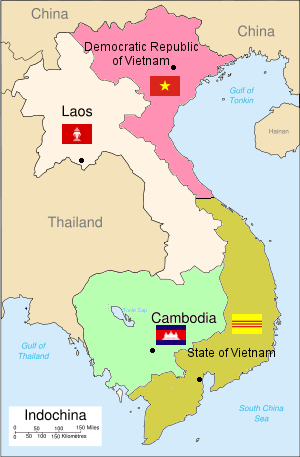
The Geneva Conference was a conference that was intended to settle outstanding issues resulting from the Korean War and the First Indochina War and involved several nations. It took place in Geneva, Switzerland, from 26 April to 20 July 1954. The part of the conference on the Korean question ended without adopting any declarations or proposals and so is generally considered less relevant. The Geneva Accords that dealt with the dismantling of French Indochina proved to have long-lasting repercussions, however. The crumbling of the French colonial empire in Southeast Asia led to the formation of the states of the Democratic Republic of Vietnam, the State of Vietnam, the Kingdom of Cambodia, and the Kingdom of Laos. Three armistice agreements about French Indochina, covering Cambodia, Laos, and Vietnam, were signed on 21 July 1954 and took effect two days later. A peace declaration about the region was also issued on 21 July 1954.
The Indochina Wars were a series of wars which were waged in Indochina from 1945 to 1991, by communist Indochinese forces against the opponents. The term "Indochina" originally referred to French Indochina, which included the current states of Vietnam, Laos, and Cambodia. In current usage, it applies largely to a geographic region, rather than to a political area. The wars included:

Army and warfare made their first appearance in Vietnamese history during the 3rd millennium BC. Throughout thousands of years, wars played a great role in shaping the identity and culture of people inhabited the land which is modern day Vietnam. Vietnam is regarded as one of the most militaristic countries in Southeast Asia, there is even a higher level belief Vietnam might be the most militaristic nation in Southeast Asia, and one of Asia and the world's most militaristic countries. The military history of the Socialist Republic of Vietnam began when Japan invaded French Indochina and soon defeated the French resistance. Since then, Vietnam has fought in many conflicts in Indochina.
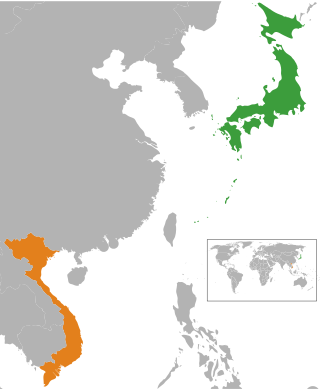
Japanese–Vietnamese relations are over a millennium old, and the establishment of friendly trade relations can be traced to at least the 16th century. Modern relations between the two countries are based on Vietnam's developing economy and Japan's role as an investor and foreign aid donor.

French Cochinchina was a colony of French Indochina, encompassing the whole region of Lower Cochinchina or Southern Vietnam from 1862 to 1946. The French operated a plantation economy whose primary strategic product was rubber.
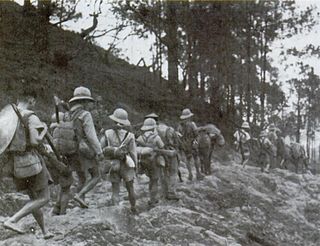
The Japanese coup d'état in French Indochina, known as Meigō Sakusen, was a Japanese operation that took place on 9 March 1945, towards the end of World War II. With Japanese forces losing the war and the threat of an Allied invasion of Indochina imminent, the Japanese were concerned about an uprising against them by French colonial forces.

Trần Trọng Kim, courtesy name Lệ Thần, was a Vietnamese scholar and politician who served as the Prime Minister of the short-lived Empire of Vietnam, a state established with the support of Imperial Japan in 1945 after Japan had seized direct control of Vietnam from Vichy France toward the end of World War II. He was an uncle of Bùi Diễm.
The earliest traces of armed conflict in the territory that constitutes modern Cambodia date to the Iron Age settlement of Phum Snay in north-western Cambodia.
The postage stamps of Vietnam were issued by a variety of states and administrations. Stamps were first introduced by the French colonial administration. Stamps specifically for Vietnam were first issued in 1945. During the decades of conflict and partitioning, stamps were issued by mutually hostile governments. The reunification of Vietnam in 1976 brought about a unified postal service.
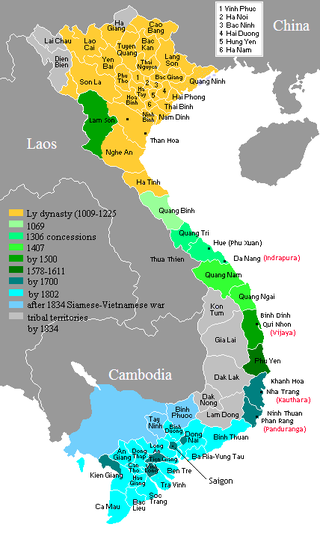
Nam tiến is a historiographical concept that describes the historic southward expansion of the territory of Vietnamese dynasties' dominions of Đại Việt from the 11th to the 19th centuries. The concept of Nam tiến has differing interpretations, with some equating it to Viet colonialism of the south and to a series of wars and conflicts between several Vietnamese kingdoms and Champa Kingdoms, which resulted in the annexation and Vietnamization of the former Cham states as well as indigenous territories.

North Vietnam, officially the Democratic Republic of Vietnam, was a socialist state in Southeast Asia that existed from 1945 to 1976, with formal sovereignty being fully recognized in 1954. A member of the Eastern Bloc, it opposed the French-backed State of Vietnam and later the Western-allied Republic of Vietnam. North Vietnam emerged victorious over South Vietnam in 1975 and ceased to exist the following year when it unified with the south to become the current Socialist Republic of Vietnam.

Cambodia–Japan relations are foreign relations between Cambodia and Japan. Japan has an embassy in Phnom Penh and Cambodia has an embassy in Tokyo.
André Joyeux (1871-?) was a French artist, first teacher and director of the Gia Định art school founded in 1913 in a suburb of Saigon, 12 years before Victor Tardieu founded the national EBAI in Hanoi.
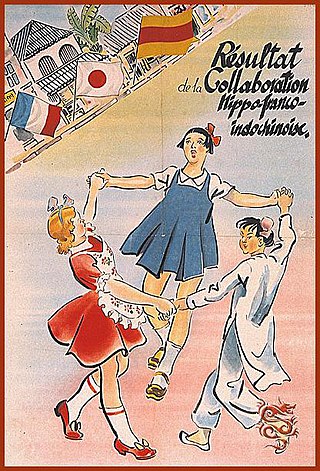
In mid-1940, Nazi Germany rapidly defeated the French Third Republic, and the colonial administration of French Indochina passed to the French State. Many concessions were granted to the Nazi-allied Empire of Japan, such as the use of ports, airfields, and railroads. Japanese troops first entered parts of Indochina in September 1940, and by July 1941 Japan had extended its control over the whole of French Indochina. The United States, concerned by Japanese expansion, started putting embargoes on exports of steel and oil to Japan from July 1940. The desire to escape these embargoes and to become self-sufficient in resources ultimately contributed to Japan's decision to attack on December 7, 1941, the British Empire and simultaneously the USA. This led to the USA declaring war against Japan on December 8, 1941. The US then joined the side of the British Empire, at war with Germany since 1939, and its existing allies in the fight against the Axis powers.

Tonkin, or Bắc Kỳ (北圻), was a French protectorate encompassing modern Northern Vietnam. Like the French protectorate of Annam, Tonkin was still nominally ruled by the Nguyễn dynasty, but in 1886, the French separated Tonkin from the Nguyễn imperial court in Huế by establishing the office of "Viceroy". However, on 26 July 1897, the position of Viceroy was abolished, officially making the French resident-superior of Tonkin both the representative of the French colonial administration and the Nguyễn dynasty court in Huế, giving him the power to appoint local mandarins. In 1887, Tonkin became a part of the Union of Indochina.

The Great Hanoi Rat Massacre occurred in 1902, in Hanoi, Tonkin, French Indochina, when the French government authorities attempted to control the rat population of the city by hunting them down. As they felt that they weren't making enough progress and due to labour strikes they created a bounty programme that paid a reward of 1¢ for each rat killed. To collect the bounty, people would need to provide the severed tail of a rat. Colonial officials, however, began noticing rats in Hanoi with no tails. The Vietnamese rat catchers would capture rats, sever their tails, then release them back into the sewers so that they could produce more rats.
References
- ↑ "French Colonial Historical Society |". www.frenchcolonial.org. Retrieved 16 August 2022.
- ↑ Michael G. Vann (2008-12-01). The Colonial Good Life: Commentary on Andre Joyeux's Vision of French Indochina (English and French Edition): Michael G. Vann, Joel Montague, Andre Joyeux: 9789744801425: Amazon.com: Books. ISBN 978-9744801425.
- ↑ Vann, Michael (2013). Twentieth Century Voices: Selected Readings in World History (Revised ed.). ISBN 978-1-62131-232-1.
- ↑ Michael G. Vann and Liz Clarke (2018-06-01). The Great Hanoi Rat Hunt: Empire, Disease, and Modernity in French Colonial Vietnam: Michael G. Vann, Liz Clarke: 9780190602697. Graphic History Series. Oxford University Press. ISBN 978-0-19-060269-7.
- ↑ Ivan Franceschini and Michael G. Vann (20 August 2020). "The Great Hanoi Rat Hunt: A Conversation with Michael G. Vann". The Made in China Journal. Retrieved 28 January 2022.
- ↑ Dubner, Stephen. "The Cobra Effect: A New Freakonomics Radio Podcast" . Retrieved 29 December 2013.
- ↑ "Show for Sept. 9, 2012. Our Man in Hanoi:... - The 7th Avenue Project: Thinking Persons' Radio". The 7th Avenue Project. 2012-09-09. Retrieved 2014-03-02.
- ↑ Vann, Michael. "Shadow Puppets and Special Forces: Indonesia's Fragile Democracy". The Dipolmat. Retrieved 29 December 2013.
- ↑ Vann, Michael. "Haunted house, haunted history". Inside Indonesia. Retrieved 29 December 2013.